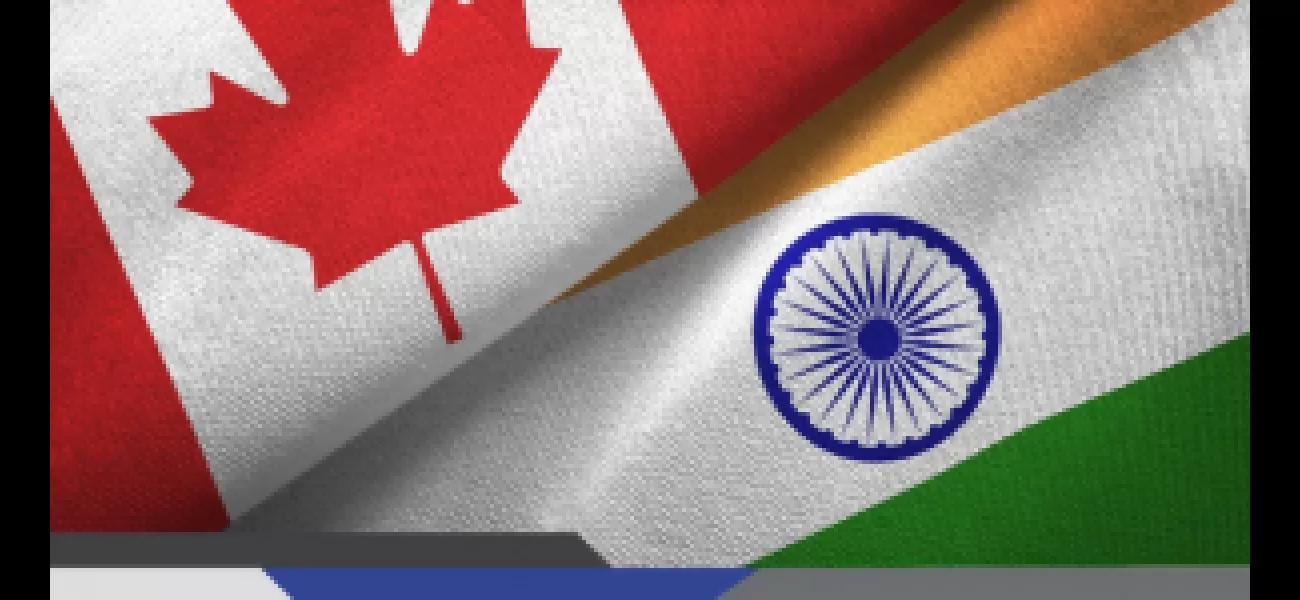India is trying to sway Canada's politics over worries about Khalistani separatists, according to a government investigation.
An official investigation found that Indian officials, along with Canada-based representatives, are working to sway Canadian communities and politicians to support India's stance on issues, particularly regarding separatists in Canada.
May 4th 2024.

A recent investigation has uncovered evidence of foreign interference in Canadian politics by Indian officials and their proxies. The probe, led by Commissioner Marie-Josee Hogue, revealed that there were attempts to sway Canada's stance on key issues to align with New Delhi's interests. This was primarily in relation to concerns over Sikh separatists in Canada. However, it was determined that these efforts did not have any impact on the outcomes of Canada's federal elections in 2019 and 2021, as the electoral system proved to be robust.
India has previously denied these allegations, calling them "baseless" and accusing Canada of meddling in their internal affairs. However, the report published on Friday highlighted China as the main perpetrator of foreign interference in Canada. According to Canadian authorities, China has been the most active foreign state actor in targeting government officials, political organizations, candidates for political office, and diaspora communities.
In regards to India, the report stated that Indian officials, along with their proxies in Canada, engaged in a range of activities to influence Canadian communities and politicians. This included foreign interference, with the aim of aligning Canada's position with India's interests on various issues. One such issue was the Canadian support for an independent Sikh homeland, which India sees as a threat to their stability and national security.
The report also noted that India does not differentiate between lawful, pro-Khalistani political advocacy and the relatively small group of Canada-based violent extremists. They view anyone aligned with the movement as a seditious threat. However, this perception is not shared by all members of Canada's large South Asian community. India views a portion of these communities as fostering anti-India sentiment, leading to their interest in influencing Canada's political landscape.
In response to these findings, India's External Affairs Ministry Spokesperson Randhir Jaiswal strongly rejected the allegations of interference in Canadian elections. He reiterated that it is not the Indian government's policy to interfere in the democratic processes of other countries and accused Canada of interfering in their internal affairs instead.
The report also highlighted that while Indian officials in Canada have increasingly relied on Canadian and Canadian-based proxies to conduct foreign interference, this makes it difficult to establish a direct link between India and these activities. These proxies work closely with Indian intelligence officials, taking both explicit and implicit direction from them.
It was also revealed that India directed foreign interference activities during the 2019 and 2021 general elections. The report stated that there is intelligence indicating that Indian proxy agents may have attempted to interfere in the democratic processes by providing illicit financial support to certain Canadian politicians. This was done in an attempt to secure the election of pro-India candidates or gain influence over those who take office. However, there was no evidence of Indian-based disinformation campaigns during the 2021 general election.
Although India was mentioned 43 times in the 194-page report, the classified supplement reviewing intelligence on potential foreign interference by India in the 2021 general election found no shortcomings in the government's response.
India has consistently maintained that their "core issue" with Canada is the space given to separatists, terrorists, and anti-India elements in the country. The report also identified other countries engaged in interference activities in Canada, including Russia, Pakistan, and Iran. Overall, it is clear that foreign interference in Canadian politics is a growing concern, and measures need to be taken to prevent it in the future.
India has previously denied these allegations, calling them "baseless" and accusing Canada of meddling in their internal affairs. However, the report published on Friday highlighted China as the main perpetrator of foreign interference in Canada. According to Canadian authorities, China has been the most active foreign state actor in targeting government officials, political organizations, candidates for political office, and diaspora communities.
In regards to India, the report stated that Indian officials, along with their proxies in Canada, engaged in a range of activities to influence Canadian communities and politicians. This included foreign interference, with the aim of aligning Canada's position with India's interests on various issues. One such issue was the Canadian support for an independent Sikh homeland, which India sees as a threat to their stability and national security.
The report also noted that India does not differentiate between lawful, pro-Khalistani political advocacy and the relatively small group of Canada-based violent extremists. They view anyone aligned with the movement as a seditious threat. However, this perception is not shared by all members of Canada's large South Asian community. India views a portion of these communities as fostering anti-India sentiment, leading to their interest in influencing Canada's political landscape.
In response to these findings, India's External Affairs Ministry Spokesperson Randhir Jaiswal strongly rejected the allegations of interference in Canadian elections. He reiterated that it is not the Indian government's policy to interfere in the democratic processes of other countries and accused Canada of interfering in their internal affairs instead.
The report also highlighted that while Indian officials in Canada have increasingly relied on Canadian and Canadian-based proxies to conduct foreign interference, this makes it difficult to establish a direct link between India and these activities. These proxies work closely with Indian intelligence officials, taking both explicit and implicit direction from them.
It was also revealed that India directed foreign interference activities during the 2019 and 2021 general elections. The report stated that there is intelligence indicating that Indian proxy agents may have attempted to interfere in the democratic processes by providing illicit financial support to certain Canadian politicians. This was done in an attempt to secure the election of pro-India candidates or gain influence over those who take office. However, there was no evidence of Indian-based disinformation campaigns during the 2021 general election.
Although India was mentioned 43 times in the 194-page report, the classified supplement reviewing intelligence on potential foreign interference by India in the 2021 general election found no shortcomings in the government's response.
India has consistently maintained that their "core issue" with Canada is the space given to separatists, terrorists, and anti-India elements in the country. The report also identified other countries engaged in interference activities in Canada, including Russia, Pakistan, and Iran. Overall, it is clear that foreign interference in Canadian politics is a growing concern, and measures need to be taken to prevent it in the future.
[This article has been trending online recently and has been generated with AI. Your feed is customized.]
[Generative AI is experimental.]
0
0
Submit Comment





